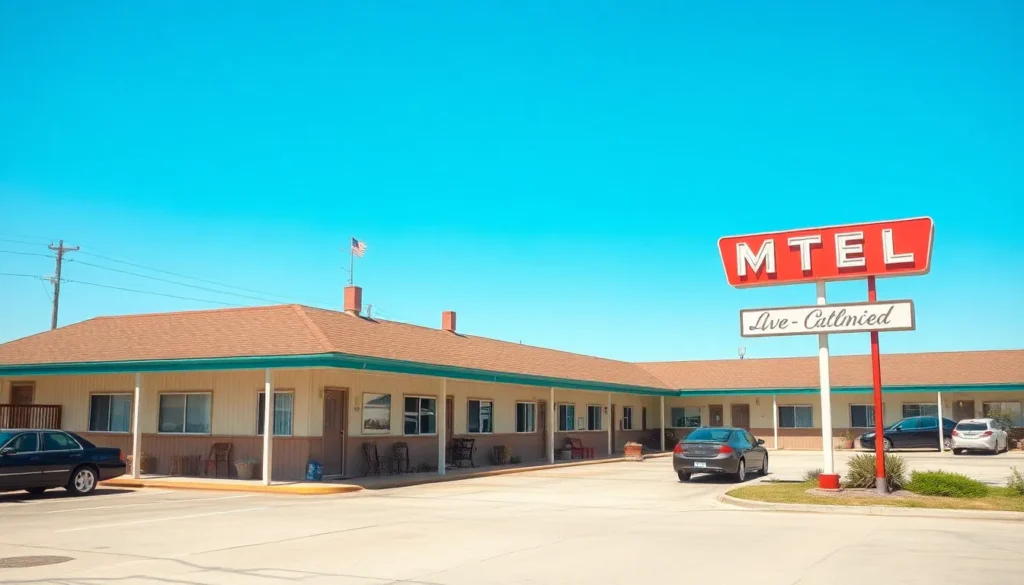When planning a getaway, travelers often find themselves at a crossroads: should they book a hotel or a motel? While both options promise a cozy place to rest, the differences can be as stark as a neon sign flashing “Vacancy” in the night. Understanding these distinctions can save time and ensure the perfect stay.
Table of Contents
ToggleOverview of Accommodations
Accommodations fall into various categories, including hotels and motels, which serve different traveler needs. Hotels, often larger in size, provide extensive amenities like pools, restaurants, and room service. They typically cater to longer stays and offer a higher level of service.
Motels, on the other hand, focus on convenience and budget-friendliness. These establishments usually feature exterior room entrances and provide easy access to parking. Travelers looking for quick stays or road trips often choose motels for their straightforward arrangements.
Both options feature essential amenities such as Wi-Fi and air conditioning, but differences exist in additional offerings. Hotels may provide fitness centers, business facilities, and valet parking, while motels tend to focus on basic services at competitive rates.
Location also influences the choice of accommodation. Hotels frequently appear in urban settings and tourist hotspots, enhancing the overall travel experience. Motels typically dot highways and rural areas, making them ideal for those on the go.
Price varies significantly between the two types of lodging. Hotels generally charge higher nightly rates compared to motels, appealing to travelers ready to invest for upscale experiences.
Understanding these differences ensures travelers select accommodations suited to their preferences and budgets. Recognizing the distinct features helps individuals make informed choices, ultimately enhancing their travel experience.
Key Differences Between Motel and Hotel

Understanding the key differences can guide travelers in their accommodation choices. Key factors include location, pricing, and room design.
Location and Accessibility
Hotels often occupy urban centers or popular tourist destinations. Travelers appreciate the accessibility hotels provide to attractions, dining, and cultural sites. Motels, on the other hand, typically line highways or rural areas. They offer convenient parking and exterior room entrances, making them ideal for road trips. Guests value the ease of access to their vehicles and the straightforward layout of motels. Accessibility remains a significant consideration when deciding where to stay.
Pricing and Amenities
Pricing structures differ significantly between hotels and motels. Hotels generally impose higher rates due to extensive amenities like pools, restaurants, and room service. Some travelers prefer these added services during their stay. Motels provide basic amenities at competitive prices, focusing on essential offerings such as Wi-Fi and air conditioning. Budget-conscious guests often find motels appealing due to lower costs while still meeting their basic needs. Understanding the price points helps travelers align their budget with their desired experience.
Room Design and Size
Room design varies notably between hotels and motels. Typically, hotel rooms feature larger living spaces with sophisticated decor and modern furnishings. Travelers seeking comfort and style often gravitate toward hotels. In contrast, motel rooms are usually smaller and functional, prioritizing practicality over aesthetics. Space constraints often limit storage and living areas in motels, catering to guests needing quick, comfortable accommodations. Recognizing these differences aids travelers in selecting the right type of lodging for their trips.
When to Choose a Motel
Motels suit travelers looking for convenience and affordability. Many benefits make motels an appealing option for various situations.
Benefits of Staying at a Motel
Cost-effectiveness ranks high among motel benefits. Rates usually remain lower than hotels, allowing budget-conscious travelers to save. Flexibility is another bonus, as motels cater to short stays, ideal for spontaneous trips. Additionally, motels often provide easy access to parking directly outside the room, streamlining the arrival and departure process. Basic amenities like Wi-Fi and air conditioning keep guests comfortable without unnecessary frills. Quick check-in and check-out processes add to the ease, making motels a smart choice for those on the go.
Typical Situations for Motel Stays
Road trips frequently lead travelers to choose motels for rest and relaxation. Stopping along highways is common, with motels positioned for quick access off major routes. Families on vacation often appreciate the straightforward accommodations as a budget-friendly alternative. Travelers attending events or visiting nearby attractions may find motels less expensive and more convenient for short stays. Additionally, weekend getaways fit well with the simplicity that motels offer, allowing guests to unwind without overspending. Business trips sometimes see individuals opting for motels, where essential services meet basic needs effectively.
When to Choose a Hotel
Travelers often select hotels for their wide range of amenities and services. Hotels generally provide facilities like restaurants, fitness centers, and swimming pools, enhancing comfort and convenience during stays.
Advantages of Hotel Stays
Hotels offer several advantages that cater to diverse traveler needs. Guests often enjoy round-the-clock service, including room service and concierge activities. Amenities frequently include spacious lobbies, complimentary breakfast options, and on-site recreational facilities. Another benefit involves loyalty programs that reward frequent guests with points for future stays. Business travelers appreciate access to conference rooms and high-speed internet, making work-related trips more manageable. Overall, hotels focus on creating memorable experiences through attention to detail and exceptional hospitality.
Ideal Scenarios for Hotel Use
Certain situations highlight the advantages of staying in hotels. Business trips commonly call for the amenities and services hotels provide, while family vacations benefit from spacious accommodations. Travelers seeking leisurely getaways often prefer hotels due to their proximity to attractions and entertainment. Additionally, special events like weddings and conferences usually require the extra space and service options that hotels offer. Planning a romantic retreat also becomes more enjoyable in hotels, as they provide intimate atmospheres and personalized services for couples.
Choosing between a motel and a hotel ultimately depends on individual needs and preferences. Travelers seeking convenience and budget-friendly options may find motels perfectly suited for their quick getaways. On the other hand, those looking for luxury and extensive amenities will likely prefer hotels to enhance their experience.
Understanding these differences not only saves time but also ensures satisfaction during travels. By considering factors like location, pricing, and desired services, travelers can make informed decisions that align with their unique travel goals. Whether embarking on a road trip or planning a luxurious vacation, knowing what each accommodation type offers can lead to a more enjoyable stay.








